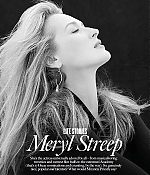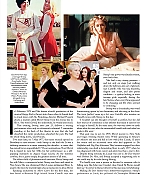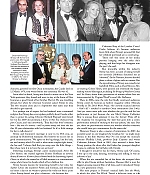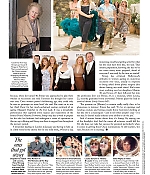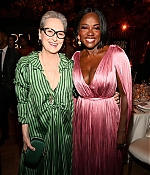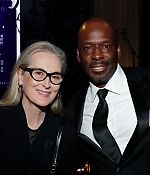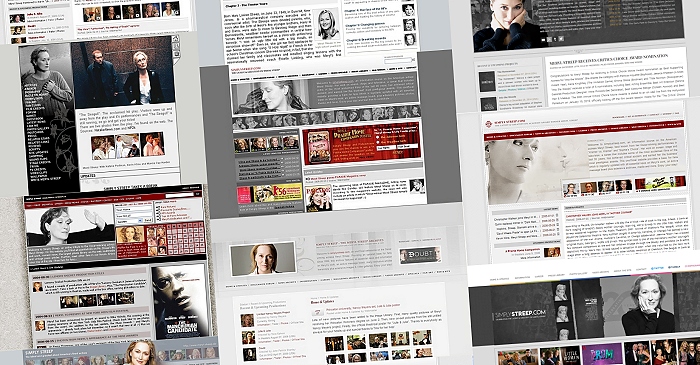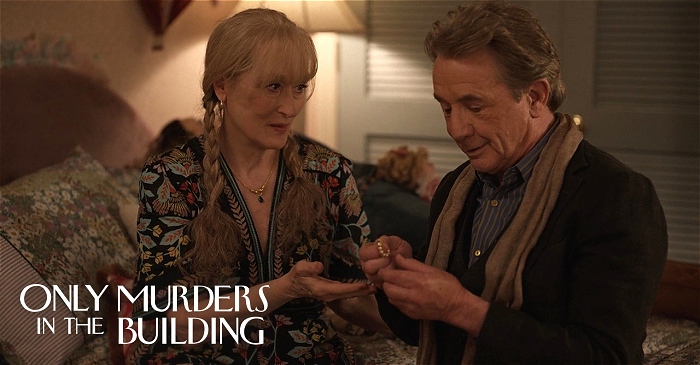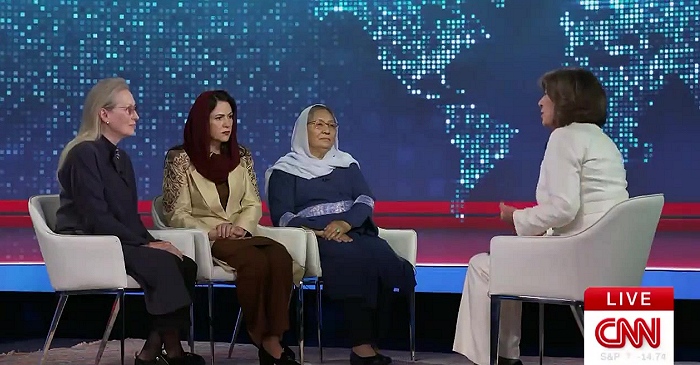
|
Life Stories: Meryl Streep
Marie Claire (UK) ·
January 2014
· Written by Michelle Davies
|
It’s February 1975 and Yale drama school’s production of the musical Happy End is thrown into chaos when its female lead is struck down with flu. Panicking, director Michael Posnick plucks a student called Meryl Streep from the chorus line to fill in. ‘She wasn’t [even] the understudy,’he would later recall. That evening, Streep, then just 25, delivers a rousing performance after only an afternoon’s rehearsal. ‘I remember standing at the back of the theatre in awe that she had absorbed the entire production, absorbed the part. She had the whole thing down,’ said Posnick. Two years later, on 7 May 1977, that same musical opened on Broadway to rave reviews – with Streep in the lead role. It was a defining moment in a career spanning five decades – a career that has earned her an unparalleled 17 Oscar nominations.Now Meryl, 64, is tipped to earn her 18th, for her performance as a pillpopping matriarch in August: Osage County. As the statistics confirm, she is, quite simply, the greatest actress of all time. The eldest child of pharmaceutical executive Harry Streep and his wife Mary, a commercial artist, Streep was born and raised in New Jersey. She was christened Mary Louise, nicknamed Mary L, and,by the time she reached high school,was known to all as Meryl. Speaking exclusively to Marie Claire for the first time, her best friend at Bernards High School, Susan Castrilli, says that Streep’s star power was already evident, even back then. ‘She had a very strong presence – and not only on stage. Just walking down the hallways, she sort of glowed,’ says Castrilli. ‘She was tall, beautiful, elegant and smart, and also pretty confident – a quality lacking in most teenage girls, especially during the late Sixties, when everything appeared to be changing and life often seemed so confusing.’ Streep was a cheerleader, was voted homecoming queen by her classmates, and also sang in the choir. The term ‘perfect’ came up a lot, says Castrilli, who remains on friendly terms with Streep to this day. ‘I wouldn’t say she thought of herself as perfect, but she did have that air of confidence in her abilities that made it easy for her to laugh at herself. At the same time, she was very down to earth about who she was,who she surrounded herself with and what her goals in life were.’
That goal was to act. In 1976 Meryl moved to New York and began winning theatre roles. While appearing in Measure for Measure she met and fell in love with John Cazale, 13 years her senior and an acclaimed actor who had appeared in The Godfather and Dog Day Afternoon.They became engaged, but their relationship was dealt a devastating blow in early 1977 when he was diagnosed with bone cancer and given less than a year to live. Despite being seriously ill, Cazale was cast in The Deer Hunter with Robert De Niro, and Streep accepted a supporting role so she could stay by his side during filming. ‘I’ve hardly ever seen a person so devoted to someone who is falling away like John was,’ Cazale’s close friend Al Pacino would later say.‘To see her in that act of love for thismanwas overwhelming.’ Making The Deer Hunter was a bittersweet experience. Streep’s performance as Linda, the girlfriend of Christopher Walken’s character, garnered her first Oscar nomination, but Cazale died on 12 March 1978, four weeks before the ceremony.He was 42. Soon after his death, Streep was forced to move out of the New York apartment they shared and went to stay at the home of Don Gummer, a good friend of her brother Harry’s. He was travelling abroad, but when he returned, Gummer asked Streep to stay. The two became close and in September that same year they decided to get married.
It is perhaps out of respect for her husband, now a renowned sculptor, that Streep has never spoken publicly about Cazale, other than to praise his acting. Director Richard Shepard interviewed her for his 2009 documentary, I Knew It Was You: Rediscovering John Cazale, and said afterwards, ‘They had this brief romantic love – like out of a movie – and he passes away, and then she has this 30-year relationship with her husband. So it’s a little strange for her to talk about it.’ Streep and Gummer’s marriage is now in its 35th year, an anomaly by Hollywood standards. She believes its success lies in good communication. ‘We agree on the big things, like the kids, sex and money, which I’m told is what most couples fight about,’ she has said. ‘I always find that you scrap over the little things – like whose turn it is to have the car serviced.’ Following marriage, Streep’s career mushroomed. After The Deer Hunter, she starred opposite Dustin Hoffman in divorce drama Kramer vs.Kramer,then followed with the harrowing Sophie’s Choice, in which she starred as a Polish woman in a concentration camp, who’s forced to decide which of her children live. Streep became known for immersing herself in her roles: for Sophie’s Choice she mastered Polish and German, and rehearsed six hours a day for six weeks to perfect the violin for Music of the Heart. Streep doesn’t just play a character – she becomes her. Catherine Bray, of the London Critics’ Circle, believes it’s because audiences know little about Streep’s personal life that her celluloid portrayals are so convincing. ‘There isn’t this sense of her media persona hanging over the roles she’s playing, and that helps her disappear into the part,’ she said. But, ironically, within the industry Streep has been accused of taking herself too seriously (Hoffman described her as ‘obsessed’).In theNineties,she even heeded pleas to show a lighter side on camera. But the repositioning of Streep as a comedy star backfired.Films such as Death BecomesHer, co-starring Goldie Hawn, were panned and eventually she began making‘serious’filmsagain,includingTheBridges ofMadisonCounty and The Hours, about three generations of women whose lives are interconnected by VirginiaWoolf ’s novel Mrs Dalloway. Then, in 2006, came the role that finally convinced audiences Streep could do humour, as fashion magazine editor Miranda Priestly in The Devil Wears Prada. Her cleverly nuanced delivery – ‘that’s all’ – resulted in another Oscar nomination (her 14th).
And yet critics were split over whether she got the nod for her performance or just because she was Meryl Streep. Catherine Bray is among those adamant it was the former: ‘Hats off to the Academy for recognising the skill that goes into a comic performance instead of sticking to the tear-jerkers,’ she says. ‘But yes, there are performances where you wonder whether someone else would have got a nomination for the same role.’ However, Streep is also a master of reinvention. In 2007, she accepted a part no one imagined she would go for – as single mum Donna in the film Mamma Mia! No one except the musical’s director Phyllida Lloyd, producer Judy Craymer and writer Catherine Johnson. Back in 2001, they received a letter from Streep praising the show after she’d taken her youngest daughter Louisa to celebrate her birthday with friends. ‘I thought it would be fun for them,’ Streep said. ‘Of course, I was up in the aisle, dancing, screaming and yelling. It was an infusion of joy.’ When the trio reminded her of the letter, she accepted their offer to play Donna without hesitation. Mamma Mia! is now the biggest grossing musical film of all time, and it introduced Streep to a new generation of fans. Her next project is Disney’s musical fable Into the Woods, in which she plays The Witch. There’s a delicious irony to it because, when she turned 40, Streep was approached to play three witches in succession and told Gummer she thought her career was over. ‘Once women passed childbearing age, they could only be seen as grotesque on some level,’ she said. She went on to win her third Oscar for her much-acclaimed, searing portrayal of an ageing Margaret Thatcher in The Iron Lady. It was a remarkable performance that captured every nuance and mannerism of the former Prime Minister.However, Streep only had a week to prepare for the role: her husband had undergone a series of operations in the run-up to filming and Streep was there to support him throughout the recovery period.
‘I remember landing in London in January and having to hole up in a little room by the electric fire for one solid week, 24 hours a day, immersing myself and getting a feel for what her life must have been like,’ she said. ‘That intense preparation, knowing she had to be ten times faster, more prepared, ahead of everyone. I was ready by the time we started.’ Streep has criticised Hollywood’s attitudes to women ageing on numerous occasions ever since, usually in response to being asked about plastic surgery (she denies having any work done). She’s even more scathing now her daughters Mamie, 30, and Grace, 27, have followed her into the profession (her son Henry, 33, is a musician, while Louisa, 22, recently graduated from university). Mamie plays the lead in medical drama Emily Owens MD. ‘The pressure on [Mamie] to remain really, really thin, to be glamorous, is intense,’ Streep has said. ‘To be at openings and wearing couture, and having people throw borrowed clothing at her like she is a mannequin – just to sell other people’s crap – it is too bad. It doesn’t really enhance your ability to do the job.’ And if anyone knows about that, it’s Streep. By staying out of the limelight, she’s had the career all actresses would kill for. Yet she does not take her success for granted, particularly when it comes to getting those Oscar nominations. ‘It still matters,’ she says, ‘because it’s so exciting.’

